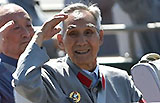US dismisses cooperation with Russia on curbing IS in Syria
(Xinhua) Updated: 2015-10-14 10:18WASHINGTON - US defense chief Ash Carter said on Tuesday the United States would not cooperate with Russia in the fight against the extremist group, the Islamic State (IS).
"We (the Pentagon) are not able to associate more broadly with Russia's approach in Syria, because it is wrongheaded and strategically shortsighted," said Carter at a press conference.
Russia began airstrikes in Syria on Sept. 30 after weeks of military buildup inside the Arab country, which was scrambling to deal with a civil war and insurgency of the IS.
While the Kremlin insisted that its goal in Syria was to target the IS, Washington accused it of targeting rebels who opposed the Syrian government.
It was not the first time for Carter to dismiss the possibility of cooperation between US-led coalition and Russia on the anti-IS campaign.
During his trip to Europe last week, Carter said in Italy that the United States would limit its discussions with Russia to "basic, technical discussions" on efforts to ensure that flights over Syria are conducted safely.
"We are not prepared to cooperate in a strategy which as we explained is flawed, tragically flawed on Russia's part," said Carter on Oct 7.
Despite Carter's dismissal of the Russian strategy in Syria, the United States on Friday announced it would abandon its own train-and-equip program in Syria, a central pillar of US President Barack Obama's counter-IS strategy which was previously aimed at recruiting 5,400 Syrian rebels each year for three years.
Instead, the Obama administration would from now on support existing rebel groups.
The change is a recognition of the failure of Obama's flagship anti-IS training program after a testy congressional hearing in September by US General Lloyd Austin, who oversees the war against the IS, revealed that only "four or five" US-trained Syrian rebels currently remained in fight in Syria.
Later, the Pentagon corrected the number of US-trained Syrian rebels currently fighting the IS in Syria to nine.
Senior officials of the Obama administration had said earlier the initial US strategy to recruit, train and arm moderate Syrian rebels failed partly because most of the Syrian rebels were more focused on fighting the Syrian government.
Then, the Pentagon admitted on Sept. 25 that the US-trained Syrian rebels gave about a quarter of US weapons to an al-Qaeda affiliate in Syria.
Meanwhile, Carter on Tuesday reiterated that the Pentagon had no plans to change its policy in Syria after Russia started its own military campaign, but said that talks between the two militaries to de-conflict the airstrikes in Syria were vital.
"Even if we can't agree on Syria policy, we should be able to at least agree on making sure our airmen are as safe as possible," he said, adding that the third round of talks were slated for Wednesday.
Carter's remarks echoed what a Pentagon spokesman told reporters that US and Russian aircraft came within visual range of each other during missions on Saturday.
To avoid air accidents over Syria during their airstrikes against the extremist group the IS, the United States and Russia were currently engaged in talks aimed at ensuring "deconfliction" of air operations in Syria.






